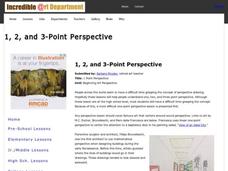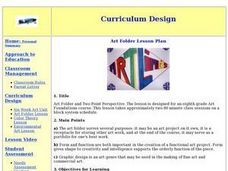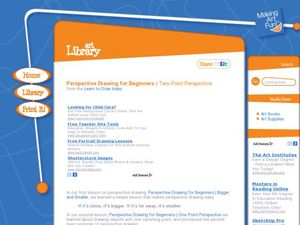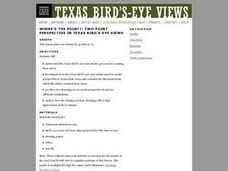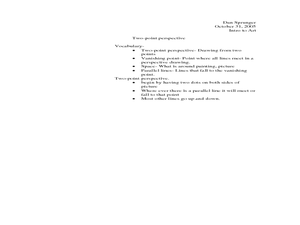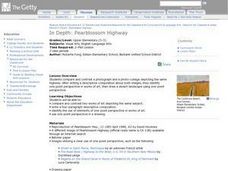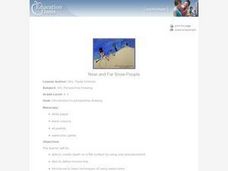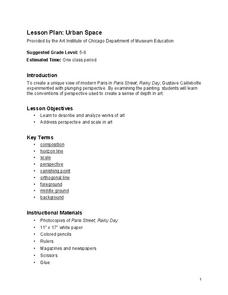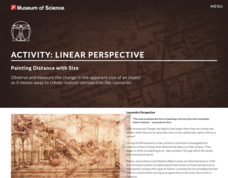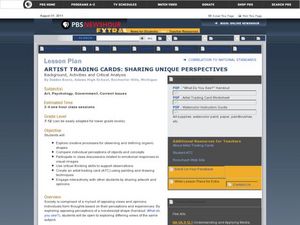National Gallery of Canada
Mastering One-Point Perspective
Cover one-point perspective through observation and practice. Class members examine several works of art that use one-point perspective, look at magazine images to find the vanishing points and horizon lines, and draw their own city...
Incredible Art
1, 2, and 3-Point Perspective
Introduce drawing students to perspective with a series of lesson plan that detail how to draft images in one-, two-, and three-point perspective. Each exercise includes step-by-step, illustrated directions and examples.
Curated OER
Art Folder and Two Point Perspective
Eighth graders examine how to create a 3-D effect on a flat surface and draw in two-point perspective. They view and discuss elements of design, analyze artwork by M.C. Escher and Roy Lichtenstein, and design and create an art folder.
Curated OER
Perspective Drawing for Beginners
Students explore one point perspective. In this perspective lesson, students discover how to create illustrations with vanishing points. Students create an original piece of art.
Curated OER
Perspective Drawing for Beginners-Two Point Perspective
Students inspect two point perspective. In this perspective lesson, students explore drawing with two vanishing points. Students create an original piece of art using two point perspective.
Curated OER
Compare and Contrast Photograph Art
Take a trip down Pearblossom Highway with this lesson plan about comparing and contrasting. Using David Hockney's Pearblossom Hwy and another image of the same highway (photograph or other image), students compare and contrast the two...
Curated OER
Where's the Point?: Two-Point Perspective in Texas Bird's-Eye Views
Students investigate how the Texas bird's-eye-view artists used two-point perspective to create their aerial views and consider the directions from which the artists oriented their views. They produce two drawings in tow-point perspective.
Curated OER
Intro to Art
Students explore illusions by drawing and viewing images in class. In this art perspective lesson, students analyze a skeleton outline drawing which demonstrates the ability to draw in a two point perspective. Students utilize the...
Curated OER
City Streets in One-Point Perspective
Students examine the basics of drawing forms in one-point perspective, and linear perspective. They transform their drawings into city scenes using one-point perspective.
Curated OER
Two-Point Perspective
Seventh graders will learn to create the illusion of depth on a two dimensional surface using the technique of perspective.Analyze famous works of art and photographs of local architecture and identify how each is using perspective....
Curated OER
In Depth: Pearblossom Highway
Students analyze a photograph and a photo-collage showing the same highway. In this visual arts lesson, students write a descriptive paragraph about both images and identify one-point perspective in art. Students then draw...
Curated OER
Lesson: Storyboarding Revolution
Kids consider revolution as a basis for creativity, art, and storytelling. After reading an excerpt from the book, Persepolis, learners choose one event from any world revolution to write about. They storyboard the event focusing on...
Curated OER
Positive Perspectives Posters
Sixth graders create a poster using one-point visual perspective. After exploring several examples of one-point perspective, 6th graders create a drawing around the theme of school community. Posters are illustrated and installed...
Curated OER
One Room School House Reading Lesson
Learners explore schools during the Colonial period. In this American history lesson plan, students participate in a simulation of school days in Colonial America. Learners visit a museum and use the schoolhouse as a setting for their...
Curated OER
Near and Far Snow People
Students study perspective drawing. They create depth on a flat surface by using size and placement and define horizontal line. They investigate the basic techniques of using watercolors.
Curated OER
Art Basics Scavenger Hunt
Hand out this worksheet and lead your class on a scavenger hunt. Pupils look for examples of shape, form, balance, pattern, perspective, space, and depth. They draw and write about the examples they've found. A great resource to add...
Curated OER
Dream Streets
Sixth graders conduct research on the internet to discover the principles of drawing using one and two point perspectives. After examining street scenes by Edward Hopper and postcards of Main Street USA in Disney, they write about and...
Art Institute of Chicago
Urban Space
The use of perspective is clear in Paris Street; Rainy Day by Gustave Caillebotte. Pupils study and discuss this example, marking the vanishing points and horizon line of a photocopy of the piece. They then create their own urban scene...
Museum of Science
Linear Perspective: Painting Distance with Size
Young scholars examine a simple set up to measure the change in the apparent size of an object as it moves away from them.
Curated OER
Artist Trading Cards: Sharing Unique Perspectives
Students examine inkblot images. In this visual arts lesson, students consider perception as an element of art as they partipate in activity that requires them create and analyze inkblot art. Students analyze several pieces of art...
Curated OER
A Bug's Life
Look at life from a bug's perspective, and create a wonderful image based on what you think it sees. Learners use the crayon resist painting technique to draw and paint and picture of a bug's world from its point of view. Tip: This would...
Curated OER
Sacred Places: California Missions from Different Perspectives
Students create a project poster displaying photos, drawings, and journal writings that incorporate the major themes of California's missions, and use perspective and point of view both visually and in writing.
Curated OER
Creating 3-D Shapes in Art
By learning techniques for drawing 3-D shapes, students can create realistic drawings.
Curated OER
Where are your borders?
Students explore the meaning of borders, both real and symbolic. After viewing film footage and visiting poetry websites, they develop their own point of view. To express their perspective, they are to write a journalism poem, or...



